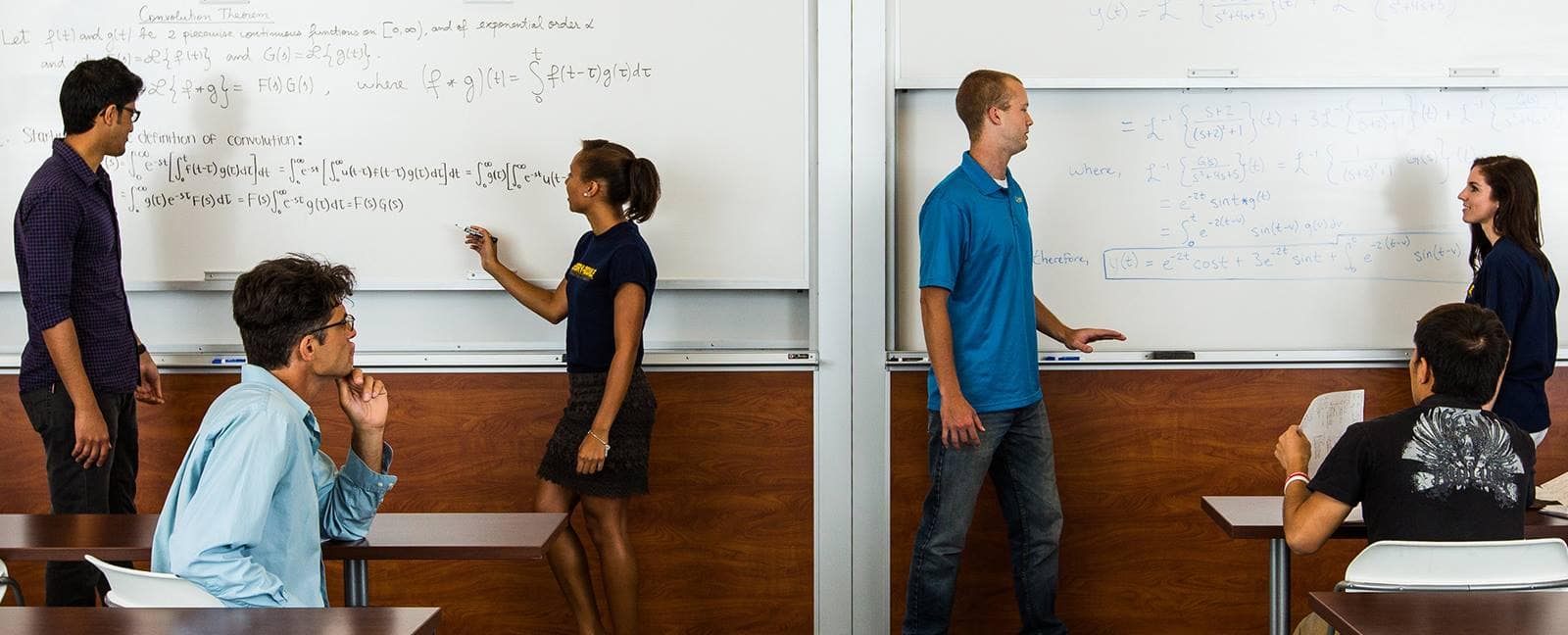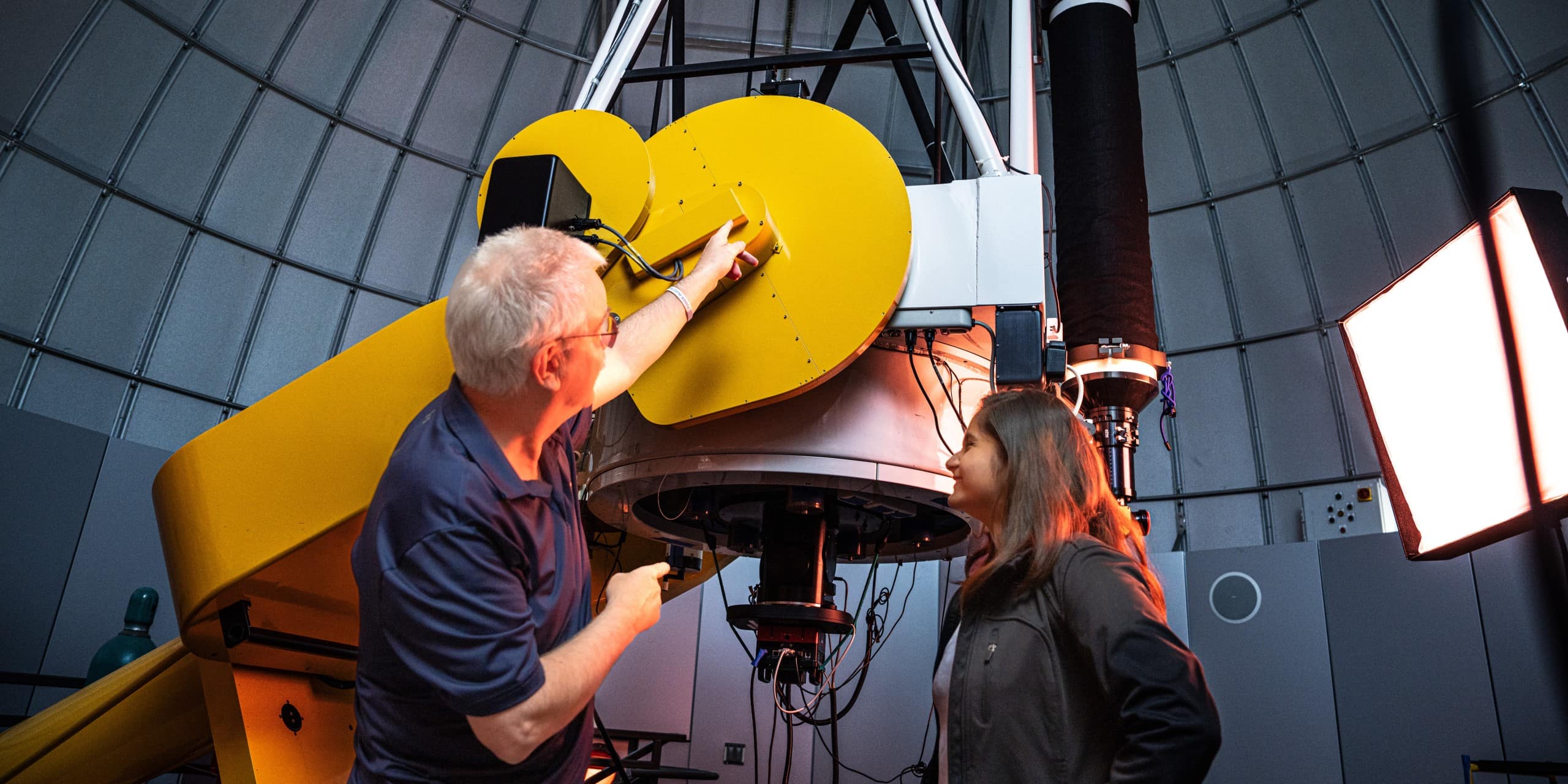
Bachelor of Science in
Computational Mathematics
Offering Data Science or Engineering Application tracks, this program develops analytical and problem-solving skills in computing, mathematics, statistics and science.
The Bachelor of Science in Computational Mathematics, available at Embry-Riddle's Daytona Beach Campus, provides a solid foundation in the application of mathematics across disciplines that require quantitative analysis. This program, housed in the College of Arts & Sciences, develops strong analytical and problem-solving skills related to computing, mathematics, statistics, and basic science.
All majors in the Computational Mathematics program, regardless of track, are encouraged to engage in industrial research opportunities under the guidance of faculty members. Students enrolled in this interdisciplinary major select the Data Science Track or the Engineering Application Track.
Data Science Track
- Designed for students interested in developing expertise in this significant growth area.
- Uses interdisciplinary methods to extract knowledge from large quantities of data.
- Employs techniques drawn from mathematics, statistics and computer sciences.
- Provides students with a strong background in creating data insights to solve real-world problems.
- Lays the foundations for continued growth with a Master’s Degree in Data Science.
- Graduates with data science skills are in high demand for employment.
Engineering Applications Track
- Designed for students interested in a variety of computational-intensive project-based classes.
- Appeals to students who double major in computational mathematics and an engineering or physics program.
- Assures that graduates are very competitive on the job market.
- Provides interdisciplinary knowledge in fundamental mathematical sciences.
- Introduces concepts and techniques of computation, optimal decision-making, high-performance computing and statistical inference.
DETAILS
About Computational Mathematics at the Daytona Beach, FL Campus
Why pursue a degree in Computational Mathematics?
The Computational Mathematics degree, housed in the Department of Mathematics, prepares students for applied mathematics careers that require highly developed critical-thinking and problem-solving skills.
What does computational mathematics coursework include?
This program emphasizes the use of computers as tools to solve mathematically modeled real-world and data-enabled problems. This program also features project-based learning as students work on real-world problems provided directly by business and industry. This experience provides students with many opportunities for internships and undergraduate research, which further bolster employment prospects.
The Data Science Track offers excellent preparation for Embry-Riddle's Master's Degree in Data Science.
What careers are available to computational mathematicians?
Because of the emphasis on applied mathematics, computing tools and data-driven applications, students secure entry-level positions in a wide variety of industries.
Industries hiring computational mathematicians include:
- Aerospace
- Engineering
- Business Finance
- Data Analytics
- Systems Analysis
- Healthcare
- And more
According to the U.S. Bureau of Labor Statistics, the overall employment of mathematicians and statisticians is projected to grow 31 percent by 2021, much faster than the average for all occupations. A B.S. in Computational Mathematics helps graduates stand out to employers in a variety of diverse industries.
Student Learning Outcomes
Students will:
- Orally communicate mathematical ideas effectively.
- Use mathematical libraries, packages, or software to solve scientific problems.
- Use numerical techniques to solve applied problems.
- Use theoretical foundations of statistics to analyze data sets.
- Work effectively in teams to solve scientific problems with significant mathematical content.
- Prepare written scientific project reports to communicate mathematical ideas effectively.
Program Requirements
| UNIV 101 | College Success | 1 |
| General Education | 31 | |
| Core | 24 | |
| Track | 19 | |
| Electives | 15 | |
| Open Electives | 30 | |
| Total Credits | 120 | |
General Education Requirements
For a full description of Embry-Riddle General Education guidelines, please see the General Education section of this catalog. These minimum requirements are applicable to all degree programs. In addition to completing General Education requirements, BSCM students develop an understanding of the concepts of advanced mathematics with emphasis on the integration of theoretical, practical, and computational viewpoints. By the end of their second year in the program, BSCM students select a track: The Data Science Track or The Engineering Application Track. In addition, BSCM students must also complete a minor or declare a second major that supplements the program core and aligns with their interests and career goals. In the final year of the program, all BSCM students complete a capstone project by applying skills they have acquired in their course work to a real-world problem.
| Communication Theory & Skills (COM 122, COM 219, COM 221) | 9 | |
| Humanities - Lower level | 3 | |
| Social Sciences - Lower level | 3 | |
| Humanities or Social Sciences - Lower or Upper level | 3 | |
| Humanities or Social Sciences - Upper level | 3 | |
| Computer Science (CS 223 or CS 225 or EGR 115) | 3 | |
| Mathematics | 8 | |
| Physical and Life Sciences - one course must include a lab | 7 | |
| Total Credits | 39 | |
BSCM Common Core
| MA 241 | Calculus and Analytical Geometry I | 4 |
| MA 242 | Calculus and Analytical Geometry II | 4 |
| MA 243 | Calculus and Analytical Geometry III | 4 |
| MA 305 | Introduction to Scientific Computing | 3 |
| MA 413 | Statistics | 3 |
| MA 432 | Applied Linear Algebra | 3 |
| MA 490 | Capstone Project | 3 |
| Total Credits | 24 | |
Engineering Application Track
The Engineering Application Track’s curriculum provides a foundation in mathematics through courses in calculus, differential equations, linear algebra, mathematical modeling, numerical analysis, and several other areas. Students develop strong problem-solving, analytical, and programming skills as they work across diverse areas of science and mathematics.
| MA 345 | Differential Equations and Matrix Methods | 4 |
| MA 348 | Numerical Analysis I | 3 |
| MA 441 | Mathematical Methods for Engineering and Physics I | 3 |
| MA 442 | Mathematical Methods for Engineering and Physics II | 3 |
| MA 410 | Linear Optimization | 3 |
| or MA 453 | High Performance Scientific Computing | |
| MA 448 | Numerical Solution of Differential Equations | 3 |
| Total Credits | 19 | |
Data Science Track
Courses within the Data Science Track provide BSCM majors with knowledge they need to analyze, understand, and visualize data. Students learn skills to collect, manage, interpret, and analyze data in order to assist in making data-driven decisions. The program includes coursework in areas such as data analytics, mining and visualization with foundational studies in mathematics, statistics, business, and computer science. This track is also a good option for students enrolled in computer science programs to seek a dual major.
| MA 345 | Differential Equations and Matrix Methods | 4 |
| or CS 317 & MA 325 | Files and Database Systems and Matrix Methods | |
| MA 348 | Numerical Analysis I | 3 |
| or MA 360 | Mathematical Modeling & Simulation I | |
| MA 412 | Probability and Statistics | 3 |
| or MA 404 | Statistics and Research Methods | |
| MA 410 | Linear Optimization | 3 |
| DS 440 | Data Mining | 3 |
| DS 444 | Scientific Visualization | 3 |
| Total Credits | 19 | |
* Elective requirement may be met with declaration and completion of any MINOR (except for Computational Math or Applied Math) or TWO DEGREES OF THE SAME RANK or DOUBLE MAJOR. (ROTC courses also acceptable)
Data Science Track - Suggested Plan of Study
| Year One | ||
|---|---|---|
| Credits | ||
| COM 122 | English Composition | 3 |
| COM 219 | Speech | 3 |
| EGR 115 | Introduction to Computing for Engineers | 3 |
or CS 223
|
Scientific Programming in C | |
or CS 225
|
Computer Science II | |
| MA 241 | Calculus and Analytical Geometry I | 4 |
| MA 242 | Calculus and Analytical Geometry II | 4 |
| Physical Science Elective | 3 | |
| UNIV 101 | College Success | 1 |
| HU Lower Level Elective | 3 | |
| SS Lower Level Elective | 3 | |
| Open Electives | 3 | |
| Credits Subtotal | 30.0 | |
| Year Two | ||
| COM 221 | Technical Report Writing | 3 |
| MA 243 | Calculus and Analytical Geometry III | 4 |
| MA 305 | Introduction to Scientific Computing | 3 |
| MA 325 | Matrix Methods | 1 |
| MA 412 | Probability and Statistics | 3 |
| Physical Science Elective | 3 | |
| Physical Science Laboratory | 1 | |
| Elective * | 3 | |
| Lower or Upper-Level Humanities or Social Science Elective | 3 | |
| Open Elective | 6 | |
| Credits Subtotal | 30.0 | |
| Year Three | ||
| CS 317 | Files and Database Systems | 3 |
| DS 440 | Data Mining | 3 |
| MA 360 | Mathematical Modeling & Simulation I | 3 |
| MA 413 | Statistics | 3 |
| MA 432 | Linear Algebra | 3 |
| Upper Level Humanities or Social Science Elective | 3 | |
| Elective * | 6 | |
| Open Electives | 6 | |
| Credits Subtotal | 30.0 | |
| Year Four | ||
| DS 444 | Scientific Visualization | 3 |
| MA 410 | Linear Optimization | 3 |
| MA 490 | Capstone Project | 3 |
| Elective * | 6 | |
| Open Electives | 15 | |
| Credits Subtotal | 30.0 | |
| Credits Total: | 120.0 | |
- *
The Elective requirement may be met with declaration and completion of any MINOR (except for Computational Math or Applied Math) or TWO DEGREES OF THE SAME RANK or DOUBLE MAJOR. (ROTC courses are also acceptable)
Engineering Application Track - Suggested Plan of Study
| Year One | ||
|---|---|---|
| Credits | ||
| COM 122 | English Composition | 3 |
| COM 219 | Speech | 3 |
| EGR 115 | Introduction to Computing for Engineers | 3 |
or CS 223
|
Scientific Programming in C | |
or CS 225
|
Computer Science II | |
| MA 241 | Calculus and Analytical Geometry I | 4 |
| MA 242 | Calculus and Analytical Geometry II | 4 |
| Physical Science Elective | 3 | |
| UNIV 101 | College Success | 1 |
| HU Lower Level Elective | 3 | |
| SS Lower Level Elective | 3 | |
| Open Electives | 3 | |
| Credits Subtotal | 30.0 | |
| Year Two | ||
| COM 221 | Technical Report Writing | 3 |
| MA 243 | Calculus and Analytical Geometry III | 4 |
| MA 305 | Introduction to Scientific Computing | 3 |
| MA 345 | Differential Equations and Matrix Methods | 4 |
| MA 413 | Statistics | 3 |
| Physical Science Elective | 3 | |
| Physical Science Laboratory | 1 | |
| Elective * | 3 | |
| Lower or Upper-Level Humanities or Social Science Elective | 3 | |
| Open Elective | 3 | |
| Credits Subtotal | 30.0 | |
| Year Three | ||
| MA 348 | Numerical Analysis I | 3 |
| MA 432 | Linear Algebra | 3 |
| MA 441 | Mathematical Methods for Engineering and Physics I | 3 |
| MA 442 | Mathematical Methods for Engineering and Physics II | 3 |
| Elective * | 6 | |
| Upper Level Humanities or Social Science Elective | 3 | |
| Open Electives | 9 | |
| Credits Subtotal | 30.0 | |
| Year Four | ||
| MA 448 | Numerical Solution of Differential Equations | 3 |
| MA 453 | High Performance Scientific Computing | 3 |
| MA 490 | Capstone Project | 3 |
| Elective * | 6 | |
| Open Electives | 15 | |
| Credits Subtotal | 30.0 | |
| Credits Total: | 120.0 | |
- *
The Elective requirement may be met with declaration and completion of any MINOR (except for Computational Math or Applied Math) or TWO DEGREES OF THE SAME RANK or DOUBLE MAJOR. (ROTC courses are also acceptable)
Get Started Now:
Summary
120 Credits
Estimate your tuition by using the Tuition Calculator
View Financial Aid Information
Learn about our General Education
Find out about transferring credits to this degree
Learn more about our Veterans & Military benefits
View our Academic Calendar



